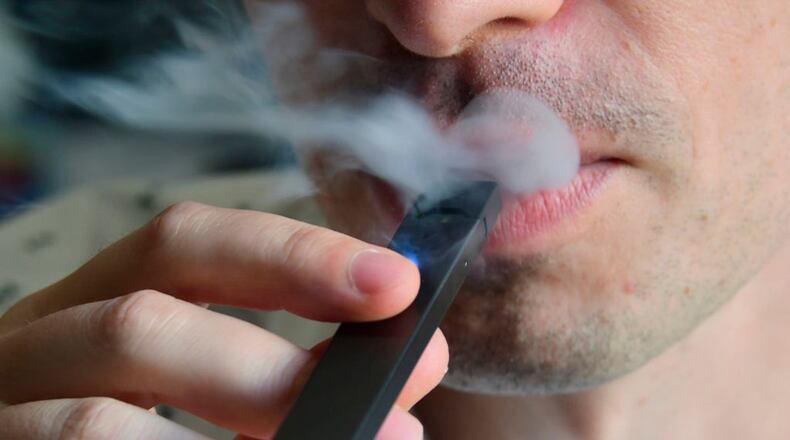RELATED: Ohio to spend $4.1 million to fight youth vaping
Northmont spokeswoman Jenny Wood said the sensors are part of a broader education effort led by Student Assistance Counselor Sheree Coffman, including presentations to every high school social studies class, plus information for parents and middle school students.
“The vaping industry has done an excellent job of luring our teens into an addiction to their product,” said Coffman, who has a dual master’s degree in clinical mental health and addictions counseling. “It is our job to provide a reason for teens to stop vaping and address the potential addiction to nicotine.”
One in six high school seniors nationally had used an e-cigarette in the past month, according to a study from the National Institute on Drug Abuse.
Northmont officials said vaping offenses in their district spiked last school year. In a Dec. 12 letter to parents, they explained the sensors – which will “go live” later this month – as well as ongoing education efforts.
RELATED: Visit teen vaping/smoking quit line
Coffman said Northmont’s goal is to use the sensors as a deterrent, not to catch kids and get them in trouble. She said all students in the district have access to free counseling and “stop-vaping” sessions upon request.
Officials with Juul, one of the largest manufacturers of vaping products, say that its products were never marketed toward children. The company has raised the purchase age for its online store to 21 and stopped selling certain flavors in stores.
But Amy Acton, director of the Ohio Department of Health, recently called the increase in youth vaping “a public health crisis” as the state allocated $4 million into youth vaping prevention efforts. The Centers for Disease Control said last week that 2,602 cases of vaping-associated lung injury involving hospitalization have been reported in the U.S. Those cases include 57 deaths.
“Evidence suggests that nicotine use during adolescence and young adulthood has long-term impacts on brain development,” Acton said.
RELATED: Ohio Health officials warn of vaping lung illness
Wood said Northmont spent $38,900 to have 28 HALO Vape sensors installed at the high school over winter break. Coffman said the sensors are in all school bathrooms – “There are a lot of memes on the internet calling the bathroom the ‘Juulroom,’” she said.
The sensor detects e-cigarette vapor – with or without marijuana ingredient THC – and sends a silent alarm to certain school staff. Those employees can check the bathroom as well as camera footage from the hall just outside to help identify who was vaping.
Coffman said vaping in school triggers a 10-day suspension that can be reduced to three days if the student participates in a free in-school vaping education program. If the vape aerosol contains THC, it’s a drug policy violation, carrying a 10-day suspension followed by an expulsion hearing. The student can avoid expulsion by doing a counseling program outside of school.
Riverside schools in Logan County also just installed 10 Halo sensors in school bathrooms and locker rooms, with high school Principal Kelly Kauffman saying the district takes its students’ health very seriously.
RELATED: Dayton-area counties report vaping illnesses
But most local schools that replied to a Dayton Daily News question — including Fairborn, Kettering, Troy and Franklin — said they are not using vaping sensors.
Lebanon schools made a major push to reduce student vaping in 2018, adding free awareness classes, but also announcing that a first violation would mean a three-day out-of-school suspension and being banned from the next school dance. Superintendent Todd Yohey said the district has continued to increase communication with students and parents regarding the health concerns of vaping.
Centerville schools spokeswoman Sarah Swan said their high school’s student BOLD group (Building Our Lives Drug-Free) is pushing vaping education efforts, in concert with guest speakers the district has brought in.
In an anti-vaping video produced by Northmont schools, Coffman said students see fewer barriers to vaping as compared to smoking, mainly because there’s no cigarette smoke-smell to give them away. But she said because of a lack of regulation on the industry, many don’t know what’s in the “juice” that they’re vaping.
RELATED: Governor wants ban on flavored e-cigarette products
She’s working on those education efforts, but sometimes a simple deterrent works too.
“Teens sometimes won’t (choose to) do what is healthy for them, but they may not want to get into trouble,” Coffman said. “If this keeps teens from vaping at school because of a fear of consequence, that is good.”
Staff writers Kaitlin Schroeder and Jenna Lawson contributed to this story.
About the Author

